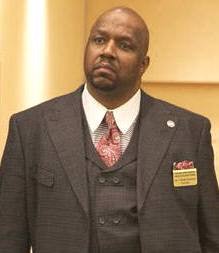 Dr. Tyrone Bledsoe is focused on the retention and graduation of Black men from college.
Dr. Tyrone Bledsoe is focused on the retention and graduation of Black men from college.CARTERSVILLE, Ga. — Seated around cafeteria-style tables at Georgia Highlands College on a recent rainy Saturday were a group of young men—mostly dressed in dark suits—who were clinging onto the words of Dr. Tyrone Bledsoe, who was working the crowd like a preacher in the pulpit.
“Saving lives,” he tells them in the call-and-response tradition that has become a part of the Black church experience in the United States. “Salvaging dreams,” they respond in unison.
And then without much prompting, the young Black men (there were three Whites among the cohort) jumped from their seats and began to embrace each other, as they proclaimed their love for each other and vowed to be a source of support.
Long before the Obama administration launched “My Brother’s Keeper,” Bledsoe has been traversing the nation for the past 25 years, building a powerful network of the Student African American Brotherhood (SAAB) on college and university campuses and in middle and high schools in more than 39 states.
On some campuses, the initiative goes by another the name: Brother2Brother. Regardless, the objective is clear: to improve the success of young minority men.
“It’s good to see policy catch up with practice,” says Bledsoe, about Obama’s MBK efforts. “We have a national crisis.”
But at a time when scholars have argued that they know how to best improve the situation that confront young men of color, Bledsoe’s approach of actively engaging the men to be the spark to ignite their own change has caught the attention of national funders and policy makers who see the SAAB model as one that has staying power.
Still, Bledsoe, who was once Vice President for Student Life and Special Assistant to the President at The University of Toledo, knows that the focus on young men of color has become quite popular in recent years, with new groups vying for dollars to help improve the lives of young men.
“We’ve been doing this for 25 years,” says Bledsoe, who will celebrate the anniversary at a black-tie event in Los Angeles next month. “Now, Black males have become a fad. Some are genuine, but some are not.”
For his part, Bledsoe is focused on the retention and graduation of Black men from college. He’s interested in the young men forming life-long partnerships and tells these SAAB student leaders who have traveled to Georgia for this day-long leadership workshop that they should sponsor activities that teach their members how to invest their finances and strategize for long-term success.
“Many of you have distractions and noises in your life that you need to quiet down,” he tells the young men who all affectionately call him “Doc.” He warns them to be proactive in helping their fellow brothers who lag behind. “We are college going, college staying, college graduating.”
It’s that kind of tough talk that Bledsoe knows is needed to transform these young men forever.
“Brothers want love. Brothers need love,” Bledsoe tells the young men, and he points out that they can be vulnerable with each other, as he doles out hugs. “I had brothers tell me, ‘Man, I don’t hug dudes.’ But you can’t save me, if you don’t touch me.”
Jamal Eric Watson can be reached at [email protected]. You can follow him on twitter @jamalericwatson















